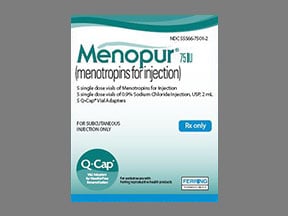
Menopur Coupons & Savings Card – Discount Prices from $5191.95
My prescription
Edit
75UNIT, Menopur (20 Solution Reconstituteds)
Select pharmacy

CVS
$5191.95
COUPON PRICE
Walgreens
$5302.23
COUPON PRICE
Albertsons
$5302.68
COUPON PRICE
Walmart
$5458.21
COUPON PRICEMenopur savings card
Show this card to your pharmacist
CVS
$5191.95
BIN
ID
PCN
GRP
015995
LHKPY241868
GDC
DR33
Powered by
Price history for Menopur
20 Solution Reconstituteds, 75UNIT
Average retail price for Menopur
Average SaveHealth price for Menopur
Our price history data is based on aggregated prescription data collected from participating pharmacies in America. Our prescription data updates daily to reflect the latest price changes. If you notice a missing data point, it means there wasn't sufficient data available to generate a monetary value for that date.
*Retail prices are based on pharmacy claims data, and may not be accurate when we don't have enough claims.
Menopur dosage forms
Dosage Quantity Price from Per unit 75UNIT 20 Solution Reconstituteds $5339.04 $266.95 75UNIT 5 Solution Reconstituteds $1348.48 $269.70
| Dosage | Quantity | Price from | Per unit |
|---|---|---|---|
| 75UNIT | 20 Solution Reconstituteds | $5339.04 | $266.95 |
| 75UNIT | 5 Solution Reconstituteds | $1348.48 | $269.70 |
What is the drug Menopur used for?
Menopur is used to treat infertility in women. It contains hormones that stimulate the ovaries to produce multiple eggs during an assisted reproductive technology cycle, such as in vitro fertilization (IVF).
Is Clomid the same as Menopur?
Clomid and Menopur are not the same. Clomid (clomiphene citrate) is an oral medication that stimulates ovulation by encouraging the release of hormones necessary for ovulation. Menopur, on the other hand, is an injectable medication that contains follicle-stimulating hormone (FSH) and luteinizing hormone (LH), which directly stimulate the ovaries to produce multiple eggs. Both are used in fertility treatments but work through different mechanisms.
Why is Menopur no longer available?
Menopur is still available and has not been discontinued. If there are any issues with availability, it may be due to temporary supply chain disruptions or specific regional distribution challenges. It is advisable to check with local pharmacies or healthcare providers for the most current information regarding its availability.
Is Menopur necessary for IVF?
Menopur is not strictly necessary for IVF, but it is commonly used as part of the treatment protocol. Menopur contains hormones that stimulate the ovaries to produce multiple eggs, which is often desired in IVF to increase the chances of successful fertilization. However, the specific medications used in an IVF cycle can vary based on individual patient needs and the fertility specialist's recommendations. It is important for patients to discuss their treatment options with their healthcare provider to determine the best approach for their situation.
What is the purpose of Menopur in IVF?
Menopur is used in IVF to stimulate the ovaries to produce multiple eggs. It contains a combination of follicle-stimulating hormone (FSH) and luteinizing hormone (LH), which help in the development and maturation of ovarian follicles. This is crucial in IVF treatments to increase the chances of retrieving multiple eggs for fertilization.
